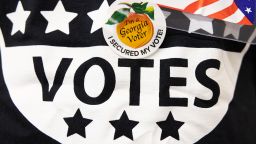Editor’s Note: Julian Zelizer, a CNN political analyst, is a professor of history and public affairs at Princeton University. He is the author and editor of 24 books, including, “The Presidency of Donald J. Trump: A First Historical Assessment.” Follow him on Twitter @julianzelizer. The views expressed in this commentary are his own. View more opinion on CNN.
My Pillow founder and CEO Mike Lindell is known for much more than selling bedding. The provocative entrepreneur has become a familiar face in national politics for supporting former President Donald Trump and funding election denialism – all while peddling his wares to Trump supporters.

Lindell is the single largest advertiser on Fox News’ opinion prime-time lineup, according to the New York Times. And he has, by his own estimates, spent as much as $40 million on conferences, a digital media platform, legal battles and more – all to advocate spurious conspiracy theories about how the 2020 election was stolen. These conspiracy theories have been central to promoting candidates, who, if victorious in the upcoming midterm elections, could be in a position to overturn the results in 2024.
Trump’s former White House strategist Stephen Bannon, who was sentenced recently to four months in prison for defying a subpoena from the House Jan. 6 committee, has called Lindell “the most significant financier in all of conservative media.”
Lindell is an important figure, especially as our core democratic institutions and norms have come under sustained attack, and his impact is a vital reminder that election denialism is not an idea that simply took off on its own. Lindell is part of a much bigger story – one that reveals how a complex web of donors, party leaders, conservative organizations and media outlets has been essential to reinforcing extremism and helping it spread from the fringes to the mainstream.
This is not the first time we have seen this phenomenon; the rise of McCarthyism, a wrecking ball during the 1950s, also depended on the support of politicians, wealthy donors, conservative organizations and media outlets. Named after Republican Senator Joseph McCarthy, McCarthyism weaponized the fear of communist infiltration within the US government. McCarthyites leveraged baseless insinuations, allegations and lies against public figures as well as members of the political establishment, particularly those in the Democratic Party.
Communism lurked everywhere, according to members of the radical right, and McCarthyites did not wait for evidence to make its case. Although there were some Communist spies lurking in the United States, there were not nearly the amount McCarthy was insinuating. Nor were most of the people who he targeted guilty of the charge. While Senator McCarthy wielded great influence between 1950 and 1954, the political tactics he deployed far outlasted his time in the upper chamber. McCarthyism – the epitome of the “paranoid style in American politics,” which historian Richard Hofstadter famously described as a combination of “heated exaggeration, suspiciousness, and conspiratorial fantasy” – fueled bitter divisions and generated fear during the Cold War.
It’s important to note that McCarthyism depended on a formidable infrastructure of support from members of the right. Otherwise, it would likely have fizzled much earlier.
In his classic work, “The Politics of Fear,” historian Robert Griffith documented how major Republican leaders in the House and Senate, many of whom didn’t personally like McCarthy or his tactics, perceived the Senator as a useful tool to attack Democrats. His extreme version of anti-communism was a powerful weapon against the popularity of the New Deal and the voting blocs and interest groups that supported FDR’s programs. Although the party leadership ultimately cracked down on McCarthy when he was no longer seen as useful, they would continue to embrace his rhetoric in the coming decades, warning about how Democrats were weak on defense and how liberal figures had dangerous associations with communist organizations.
Right-wing anti-communism also depended on big funders. There was an entire generation of financiers in the 1940s and 1950s, such as Texas oil magnates H.L. Hunt and Clint Murchison, as well as businessmen Russell Maguire and J. Howard Pew, who provided money to right-wing organizations, publications and causes.
Organizations such as Fred Schwartz’s Christian Anti-Communist Crusade and the John Birch Society grew in popularity. They sponsored large rallies and small gatherings to promote right-wing causes. These groups were central to the rise of Arizona Senator Barry Goldwater, who won the Republican presidential nomination in 1964 despite the fact that he was considered far to the right of mainstream at the time. Members of these groups continued to sound the alarm on communism and alleged it was lurking in the United States, even within presidential administrations.
The anti-communist crusade also counted on the media. McCarthy counted on some reporters of friendly newspapers to amplify his talking points while blocking hostile ones from his press conferences. Conservatives also had a robust media ecosystem of their own with talk radio hosts like Clarence Manion, who drew massive audiences spreading conspiratorial claims. Publishing houses like Regnery put out conservative books that enjoyed robust sales while magazines like “The Freeman and The American Mercury” propagated the hardline.
The sociologist Daniel Bell brought together prominent social scientists in the 1963 book, “The Radical Right,” to better understand how these forces had gained such a hold in the nation. Looking at these developments, he warned, “given the severe strains in American life, the radical right does present a threat to American liberties, in a very different and less immediate sense [than an electoral takeover]. Democracy, as the story history of Europe has shown, is a fragile system, and if there is a lesson to be learned from the downfall of democratic governments in Italy, Spain, Austria, and Germany … it is that the crucial turning point comes … when political parties or social movements can successfully establish ‘private armies’ whose resort to violence … cannot be controlled by the elected authorities, and whose use of violence is justified or made legitimate by the respectable elements in society.”
These concerns reached the highest levels of power. When President John F. Kennedy asked an adviser, Myer Feldman, to put together a study of the radical right, he detailed just how extensive the movement was, with its own sources of money, organizational support and proximity to mainstream politics. Feldman informed the president that the radical right, which he believed different though connected to the “conservative right” was spending millions a year on radio broadcasts alone. Feldman warned that the difference between extremists and mainstream Republicans was in “degree and intensity, but not in kind.” The right was “more successful, politically, than is generally realized.”
Get our free weekly newsletter
- Sign up for CNN Opinion’s newsletter.
- Join us on Twitter and Facebook
Today the situation is not that much different. Conservative businessmen like Lindell have been pivotal to financing election denialism. Republican leaders such as Senator Mitch McConnell and Congressman Kevin McCarthy have learned to live with extremists within their party, allowing them to gain positions of power because it has been in their perceived partisan interest. Conservative organizations such as the Stop the Steal Movement and the Proud Boys are the ground troops for these theories. Conservative outlets – from Fox News to social media apps like Parler offer massive platforms where election lies and other conspiracy theories are allowed to spread. Mainstream journalists have also been guilty of “both-sides-ism,” trying so hard to equate the polarization of the left and right that they are reluctant to call out the anti-democratic extremism that has shaped only one side of the political spectrum.
Unless those who want to defend democracy go after the sources underpinning election denialism in 2022 by boycotting businesses that sponsor these sorts of candidates and funding alternatives to election denialist candidates, they won’t make much progress. Election denialism is gaining, not losing, strength.
"Opinion" - Google News
October 29, 2022 at 06:00AM
https://ift.tt/r1j650D
Opinion: Why My Pillow Guy is a central figure in the rise of right-wing extremism - CNN
"Opinion" - Google News
https://ift.tt/m4zBNi7
Shoes Man Tutorial
Pos News Update
Meme Update
Korean Entertainment News
Japan News Update


No comments:
Post a Comment